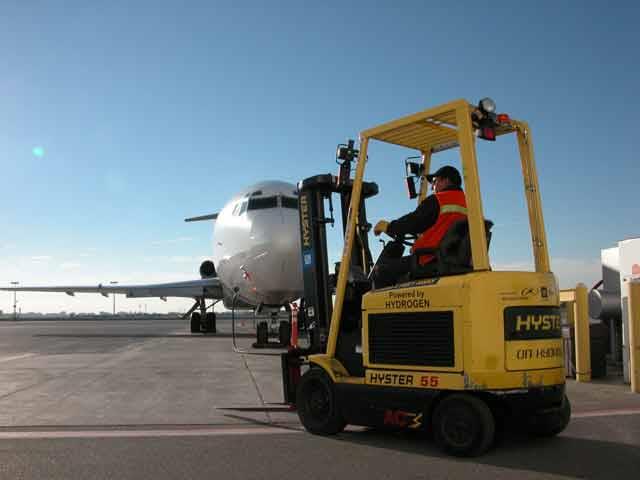 FedEx employee on Hyster forklift at Toronto airport. |
Clean-energy solution provider Hydrogenics Corp is exploring more forklift applications after leading a consortium through alpha trials last year (
Forkliftaction.com News #195).
"We are talking to [several] OEM forklift manufacturers," said Melissa McKinnon, Hydrogenics product manager for mobility power systems.
During 2005, "we put our technology to the test in real-world applications, and now we are coming out with more robust, commercial" hydrogen-based fuel cell power modules for use on forklifts, McKinnon said.
Two energy-modified Hyster Co 5,500lb (2,475kg) forklifts took part in last year's in-service and refuelling demonstrations at the Oshawa assembly complex of General Motors (GM) Canada from January 17 to April 8 and at FedEx Canada operations, at Toronto Pearson International Airport, from August 1 to September 30. The project cost CAD3.54 million (USD2.85 million).
A Hydrogenics analysis found fuel cell-powered forklifts saved more than CAD1400 (USD1128) a month per forklift in comparison to slow or rapid charge. Labour productivity improvements drove most of the savings.
Between demonstrations at the two locations, Hydrogenics made minor adjustments to the Class 1 four-wheel, sit-down-rider, cushion-tyre Hysters.
"After the deployments, we collected information," evaluated the economics and began redesigning systems for next-generation tests, possibly in 2006's fourth quarter, McKinnon said. New locations would be identified for subsequent efforts to optimise the technology and drive out costs.
"The beta version will be available for commercial sale," McKinnon said.
In the 2005 tests, government-funded Sustainable Development Technology Canada provided CAD1.56 million (USD1.26 million); Hydrogenics, Hyster parent NACCO Materials Handing Group, GM, FedEx and Deere & Company provided CAD1.59 million (USD1.28 million); and the Canadian Transportation Fuel Cell Alliance provided CAD390,000 (USD310,000). The consortium was disbanded when the project ended.
"Fuel cells offer distinct advantages over current technologies" with users getting the benefits of both an internal combustion engine (ICE) and a battery, McKinnon said. Fuel cell technology "is emission free and has low noise and the extended run time and fuel time of an ICE. We see the cost of ownership being attractive and lower than rapid-charge scenarios".
Hydrogenics develops fuel cell power modules, low-pressure stacks and test stands and hydrogen generation systems. The Hydrogenics ultracapacitor-equipped hybrid design relies on power from the fuel cell and energy from an energy storage device.
"Duty cycles of forklifts are spiky" and require peak power for short periods of time, McKinnon said. "If you size a fuel cell for closer to average power, you can reduce the overall cost of the package."